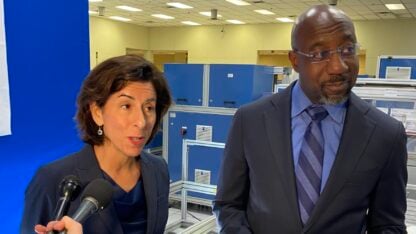DeKalb School Cluster Tries to Ease Overcrowding

Martha Dalton / WABE
It’s no secret that Atlanta’s population is booming. According to U.S. Census data, the metro Atlanta region grew by more than 10 percent from April 2010 to July 2015. That kind of rapid growth often leads to overcrowding in schools. So some school districts end up redrawing attendance lines fairly frequently, a process referred to as redistricting.
This year, the DeKalb County school system is going through a similar process to ease overcrowding in one “cluster” of schools. The Cross Keys cluster includes five elementary schools, Sequoyah Middle School and Cross Keys High School. The community is largely Latino, and many students come from low- and mid-income homes.
Cross Keys English teacher Rebekah Morris says the cluster is also tight-knit.
“In the Cross Keys cluster, we’re kind of like a family,” she says. “Our students repeatedly come back and tell us that it feels very comfortable, very safe being at Cross Keys.”
Morris doesn’t just teach kids in this community. She also lives there.
The area is growing rapidly. That’s led to school overcrowding, and lots of portable classrooms. This year, officials put a plan in place to relieve some of that. Hundreds of students were moved to different elementary schools within the cluster.
Adjusting To Change
Mayra Ayala’s second-grade son was rezoned from Montclair Elementary to Fernbank this year.
“At first it was hard,” she says. “We didn’t really know what was going on until the very last minute.”
Her son now catches the bus at 6:30 a.m. because Fernbank is 30 minutes away from where they live.
DeKalb Superintendent R. Stephen Green admits there have been some snags.
“There are pockets here and there where there are [transportation] delays, and when those have been brought to our attention, we’ve moved right after them,” Green says. “So we’ve had to make adjustments.”
Morris said some former Cross Keys students told her the adjustment to Chamblee High School was difficult.
“While Chamblee High School has better facilities, more course offerings, and it was closer to a lot of the kids’ homes, it was a really difficult thing for a lot of sophomores, juniors and seniors, who had kind of gotten used to the Cross Keys culture having to go to a new high school,” she says.
But Green is generally pleased with how things have gone. And Mayra Ayala says she likes her son’s new school.
“He’s improving from where he was last year – his reading, his math – it has really picked up,” she says. “The teachers are really nice, the staff, the students … everybody was very welcoming to us.”
Green says this year’s plan is temporary.
“It’s an attempt to relieve overcrowding and basically buy us some time while we build a new structure,” says Green.
He says it’s not a redistricting effort. That will come years later for this cluster, after new schools are built.
But this process is similar. The district sought public input, developed a plan and rezoned some students temporarily. And – like redistricting – there were ups and downs.
The Great Unknown(s)
There is another complication that could impact this school cluster and future redistricting plans. Many families in the community live on or near Buford Highway. Planned redevelopment along the corridor could result in housing changes. But it’s unclear what those might be.
“[The families] get a reputation for being transient because [they live in] apartment complexes, but many of the parents and families, they move chasing lower rent prices along Buford Highway,” says Morris. “And many of the times, it’s still within the Cross Keys cluster, so changing schools isn’t one of the things they have to worry about.”
Green says the school system could have some influence, but it’s unclear how much.
“We track that very closely and are monitoring it, but we don’t control it,” Green says. “We just have to better understand it and anticipate where it may go and how we need to adjust our plans accordingly.”
Uncertainty is a common problem when students are rezoned, according to Virginia Commonwealth University education professor Genevieve Siegel-Hawley.
“Very, very often, school officials and housing officials and developers are not in conversation with each other,” she says. “I think regular meetings of those stakeholders to understand where the new developments are being planned, what that’s going to mean for school capacity, are really important.”
Many districts face stumbling blocks when trying to solve overcrowding problems. The Gwinnett County school district has grown so fast, it has undergone redistricting eight times in 11 years. Superintendent Alvin Wilbanks said the process was “akin to goat roping.”
DeKalb is trying to get its goats in line now so it doesn’t have to use too much rope down the road.








